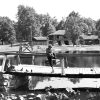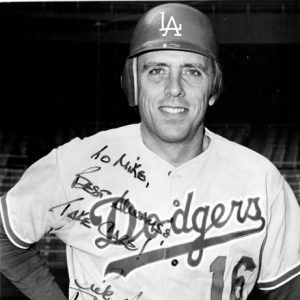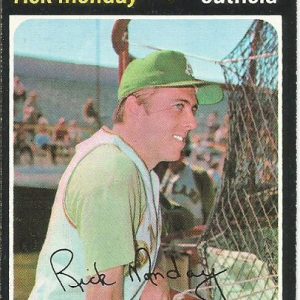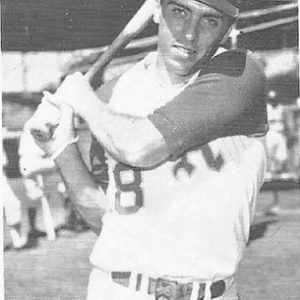calsfoundation@cals.org
Rick Monday (1945–)
Rick Monday was an All-Star major league baseball player who played for nineteen seasons. He had his longest stint with the Los Angeles Dodgers, winning a World Series with the team and going on to serve as a Dodgers broadcaster on television and radio. Monday is perhaps best known for a 1976 incident in which he prevented a flag from being burned on the field at Dodger Stadium.
Robert James Monday Jr. was born on November 20, 1945, in Batesville (Independence County), the only child of Robert James Monday Sr. and Nelda Marie Monday. The family left Arkansas when Monday was young, and he grew up in Southern California. When Monday was twelve, his father left the family, leaving his mother with the responsibility of raising him. Monday’s many youth league coaches, as well as his high school mentors, helped shepherd his baseball talent.
After starring at Santa Monica High School, he considered whether to sign with a major league team or accept a scholarship to play baseball in college. It became a contest between the Los Angeles Dodgers’ scout Tommy Lasorda, who offered a $20,000 signing bonus (a good figure for the time) and Arizona State University coach (and Arkansas native) Bobby Winkles, who drew upon their shared roots and promised Monday’s Arkansas-born mother that he would take care of her son.
Heading off to Arizona State University, Monday joined a Sun Devils program that would soon include future Hall of Famer Reggie Jackson as a freshman. In 1965, the team won the school’s first-ever National Collegiate Athletic Association (NCAA) crown, capturing the NCAA College World Series championship in Monday’s sophomore season. The undisputed team leader, Monday earned All-American honors and was named College Player of the Year. He was also the first player selected in the inaugural Major League Baseball player draft in 1965.
Signing with the Kansas City Athletics, who gave him a $100,000 bonus, he started his professional career in the Single A Northwest League playing for the Lewiston Broncs in Lewiston, Idaho. Following that abbreviated season, in September he headed to boot camp for the Marine Corps in San Diego, beginning a six-month commitment that would take him to the beginning of spring training. Monday spent the 1966 season playing for the Mobile A’s in the Double A Southern League. The team won the league championship, and five of its players—including Monday, future all-star Sal Bando, and future major league manager Rene Lachemann—were called up to the majors. There, Monday made his major league debut on September 3, 1966.
Monday had a solid major league career, compiling a lifetime batting average of .264 over nineteen seasons from 1966 to 1984. He played for the Athletics in Kansas City from 1966 to 1967 and then, when the team moved, in Oakland from 1968 to 1971; this was followed by the Chicago Cubs from 1972 to 1976 and the Los Angeles Dodgers from 1977 until 1984. Over this span of time, Monday hit 241 home runs, had 1,619 hits, and batted in 775 runs. The left-handed hitting and throwing centerfielder was chosen as an All-Star in both 1968 and 1978. In addition, Monday hit twenty or more home runs three times—including the game-winning home run in the winner-take-all Game 5 of the NLCS at Montreal that launched the Dodgers into the 1981 World Series, which they won in six games over the Yankees.
Despite these accomplishments, Monday is by all accounts best known for an incident that occurred on April 25, 1976. At that time, Monday was with the Cubs, who were playing a game in Los Angeles against the Dodgers. During a three-game series at Dodger Stadium, Monday, who had started in center field, was getting loose between the top and bottom of the fourth inning, tossing the ball with teammate Jose Cardenal. When Monday saw two people run past Cardenal toward shallow left center field, he realized that they were carrying an American flag and had begun dousing it with lighter fluid. The Marine Corps Reserves veteran raced toward the pair and scooped up the flag before they were able to light it. Continuing to run, he handed the rescued flag off to Dodgers pitcher Doug Rau, while Dodger third base coach Tommy Lasorda, who would be named manager the following season, ran past Monday, heading toward the intruders while stadium security also converged on them.
During all of this, announcer Vin Scully cried out from the broadcast booth, “It looks like he’s going to burn a flag!” The crowd of 25,167, many of them reacting to Scully’s words, gave Monday a standing ovation and burst into a spontaneous singing of “God Bless America” as security took away the intruders, later identified as a father and his eleven-year-old son. The Dodger Stadium scoreboard flashed the message: “Rick Monday—You Made a Great Play.”
At the time, cable TV was in its infancy, and the Dodgers did not televise many home games. However, a fan captured the moment on a Super-8 camera. The following month, the Dodgers presented Monday with the flag he had saved, and he counts it among the prized items in his collection of baseball memorabilia.
After his playing days ended in 1984, Monday turned to broadcasting the next year, working as a sports anchor on KTTV in Los Angeles. In addition, he did the play-by-play and hosted the pregame show for the Dodgers games that aired on DodgerVision and Z Channel. His work earned him an Emmy nomination as host of the Dodgers’ pregame show on KTTV’s “1988 Dodger Central,” and he won an Emmy in 2001 for Live Sports Coverage. Monday has also called games for the College World Series, and he worked for the San Diego Padres from 1989 to 1992. But his most consistent broadcasting role has been with the Dodgers’ broadcast team, which he joined in 1993, where he continues to offer insights and observations honed in a five-decade association with major league baseball.
Growing up in Santa Monica, where he lived about a block from the airport, he had a long-time interest in flying, and in 1971 he got his pilot’s license.
Monday, who lives with his wife Barbaralee Monday in Vero Beach, was inducted into the Arizona State University Hall of Fame in 1975 and the College Baseball Hall of Fame in 2016.
For additional information:
“Rick Monday.” BaseballReference.com. https://www.baseball-reference.com/players/m/mondari01.shtml (accessed February 25, 2020).
“Rick Monday.” Dodger Broadcasters. https://www.mlb.com/dodgers/team/broadcasters (accessed February 25, 2020).
Stuckmeyer, Luke. “Looking Back on Rick Monday’s Flag-Saving Incident in 1976.” NBC Sports, Chicago, April 25, 2019. https://www.nbcsports.com/chicago/tags/rick-monday (accessed February 25, 2020).
William H. Pruden III
Ravenscroft School


 Rick Monday
Rick Monday  Rick Monday
Rick Monday  Rick Monday
Rick Monday 



Comments
No comments on this entry yet.